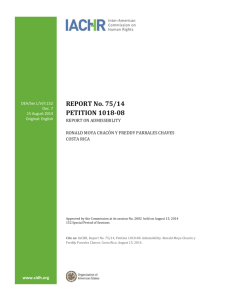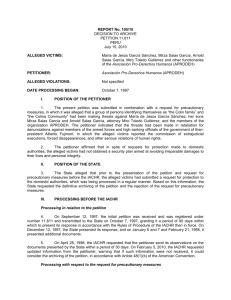florentín gudiel ramos, makrina gudiel álvarez et al.
advertisement
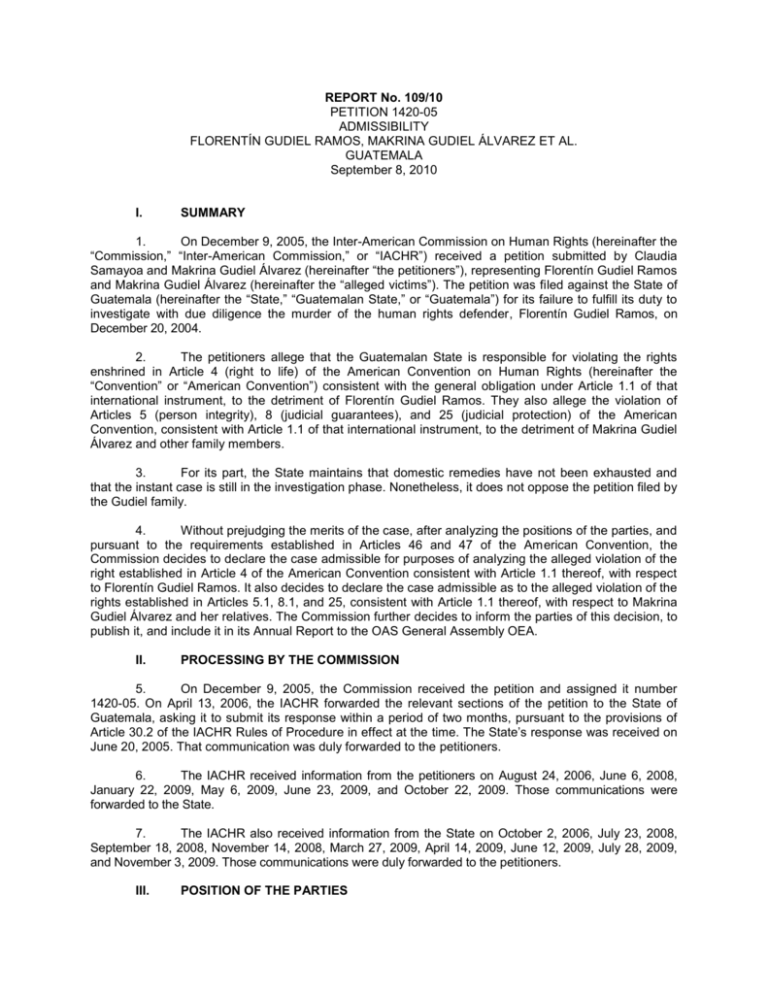
REPORT No. 109/10 PETITION 1420-05 ADMISSIBILITY FLORENTÍN GUDIEL RAMOS, MAKRINA GUDIEL ÁLVAREZ ET AL. GUATEMALA September 8, 2010 I. SUMMARY 1. On December 9, 2005, the Inter-American Commission on Human Rights (hereinafter the “Commission,” “Inter-American Commission,” or “IACHR”) received a petition submitted by Claudia Samayoa and Makrina Gudiel Álvarez (hereinafter “the petitioners”), representing Florentín Gudiel Ramos and Makrina Gudiel Álvarez (hereinafter the “alleged victims”). The petition was filed against the State of Guatemala (hereinafter the “State,” “Guatemalan State,” or “Guatemala”) for its failure to fulfill its duty to investigate with due diligence the murder of the human rights defender, Florentín Gudiel Ramos, on December 20, 2004. 2. The petitioners allege that the Guatemalan State is responsible for violating the rights enshrined in Article 4 (right to life) of the American Convention on Human Rights (hereinafter the “Convention” or “American Convention”) consistent with the general obligation under Article 1.1 of that international instrument, to the detriment of Florentín Gudiel Ramos. They also allege the violation of Articles 5 (person integrity), 8 (judicial guarantees), and 25 (judicial protection) of the American Convention, consistent with Article 1.1 of that international instrument, to the detriment of Makrina Gudiel Álvarez and other family members. 3. For its part, the State maintains that domestic remedies have not been exhausted and that the instant case is still in the investigation phase. Nonetheless, it does not oppose the petition filed by the Gudiel family. 4. Without prejudging the merits of the case, after analyzing the positions of the parties, and pursuant to the requirements established in Articles 46 and 47 of the American Convention, the Commission decides to declare the case admissible for purposes of analyzing the alleged violation of the right established in Article 4 of the American Convention consistent with Article 1.1 thereof, with respect to Florentín Gudiel Ramos. It also decides to declare the case admissible as to the alleged violation of the rights established in Articles 5.1, 8.1, and 25, consistent with Article 1.1 thereof, with respect to Makrina Gudiel Álvarez and her relatives. The Commission further decides to inform the parties of this decision, to publish it, and include it in its Annual Report to the OAS General Assembly OEA. II. PROCESSING BY THE COMMISSION 5. On December 9, 2005, the Commission received the petition and assigned it number 1420-05. On April 13, 2006, the IACHR forwarded the relevant sections of the petition to the State of Guatemala, asking it to submit its response within a period of two months, pursuant to the provisions of Article 30.2 of the IACHR Rules of Procedure in effect at the time. The State’s response was received on June 20, 2005. That communication was duly forwarded to the petitioners. 6. The IACHR received information from the petitioners on August 24, 2006, June 6, 2008, January 22, 2009, May 6, 2009, June 23, 2009, and October 22, 2009. Those communications were forwarded to the State. 7. The IACHR also received information from the State on October 2, 2006, July 23, 2008, September 18, 2008, November 14, 2008, March 27, 2009, April 14, 2009, June 12, 2009, July 28, 2009, and November 3, 2009. Those communications were duly forwarded to the petitioners. III. POSITION OF THE PARTIES 2 A. The petitioners 8. The petitioners allege that the State of Guatemala has failed to fulfill its duty to investigate with due diligence the murder of the human rights defender, Florentín Gudiel Ramos, and acts of intimidation against his daughter, Makrina Gudiel Álvarez, also a human rights defender. 9. They maintain that Florentín Gudiel Ramos, a carpenter by trade and a demobilized member of the Guatemalan National Revolutionary Unit (URNG) was engaged in supporting community education in Santa Lucía Cotzumalguapa as well as housing projects for demobilized combatants developed by the Guillermo Toriello Foundation. In addition to having been declared an “anonymous hero” by the United National Development Programme in 2002, along with his family he was seeking justice for the forced disappearance of his son, José Miguel Gudiel Álvarez (alleged victim in case 12.590 “Diario Militar” before the IACHR). In 2003, the community appointed him Chair of the Education Committee of the Self Managed School. Regarding Makrina Gudiel Álvarez, the petitioners indicate that she was organizing the municipality’s Community Development Councils, defining priority projects, and supporting social audit projects and education in the community. 10. They allege that on December 20, 2004, at about ten in the morning, Mr. Gudiel was riding his bicycle from the municipal headquarters of Santa Lucía de Cotzumalguapa to his home after handling some business and was three hundred meters from his house when, according to witness testimony, he was intercepted in the roadway by two bicycles and a grey pickup truck with tinted glass windows. They maintain that armed men in the pickup shot him in the back to knock him off the bicycle and later got out of the truck, shot him in the forehead, and then shot him once more for good measure in the left temple. According to the petitioners, nine-millimeter hollow point bullets were used. 11. The petitioners state that on the night of the same day, at the wake for Mr. Gudiel, an alleged seven-member military patrol led by an alleged kaibil1 arrived in a white pickup without plates and set up in front of the house taking attack positions to intimidate those there and left shortly thereafter. During the next nine days, those who participated in Catholic rites began to receive threats telling them they would suffer the same fate. The petitioners state that some days later a pickup with armed men wearing Guatemalan Republican Front (FRG) t-shirts positioned itself in front of the house during novena prayers. Messages have been sent by various means to Mr. Gudiel’s family, particularly Makrina Gudiel, indicating that the threats are meant for her and she should flee. 12. The petitioners allege that the initial investigative activities produced indications of a planned action. They point out that there was no robbery, so that the motive for the murder was related to the activities of Mr. Gudiel and his daughter. They say that there is a history of death threats and intimidation against Makrina Gudiel. They indicate that even though the authorities were informed from the outset that this was very likely a political murder, the authorities have never taken this fact into account, stating that this is just one more case of ordinary violence. 13. The petitioners indicate that they gave the authorities the names of the potential masterminds of Mr. Gudiel’s murder, but the only measures taken to verify that information were to ask the Citizen’s Registry for identification data on those persons and to request a report from the Weapons and Ammunitions Control Department of the Ministry of Defense regarding whether those individuals have a license to bear or own firearms, the answer to which was negative. 14. They report that although the State indicates that it has carried out various investigative procedures, through the Office of the Public Prosecutor, those procedures have not helped to clarify the facts, much less identified the individuals who are criminally responsible, because no substantive progress has been made in terms of the investigation. In addition, they state that the time that has 1 The petitioners refer to the kaibiles as an elite fighting force of the Guatemalan Army, which the Commission for Historical Clarification has accused of having committed serious human rights violations during the period of internal conflict. 3 elapsed since the murder makes it more difficult to conduct timely investigative procedures that yield positive results. 15. According to the petitioners, the lack of investigation and the absence of an effective remedy have made it impossible for the family to obtain justice. In addition, they allege that the authorities have refused to allow them access to the judicial file and a copy thereof, arguing that they are not parties to the proceeding. 16. The petitioners indicate that throughout the entire process pursued by the family, they have always had the burden of the investigation. They have presented witnesses to the Office of the Public Prosecutor, have sought to have procedures carried out, and have participated in some of them. However, many procedures have not been carried out, among them the reconstruction of the scene of the crime. They also state that the participation of family members and witnesses puts their lives at high risk. Nonetheless, the Office of the Public Prosecutor has not shown any interest in ensuring their security or protecting the witnesses. 17. According to the petition, Florentín Gudiel Ramos and his daughter Makrina were the victims of repeated threats. On November 15, 2003, a former kaibil threatened Florentín Gudiel, Makrina Gudiel, and her son with death. This is apparently because this person was removed from the chairmanship of the Education Committee of the Self Managed School based on indications that funds had been misused and Mr. Gudiel succeeded him in this position. Although it alleges that the facts have been reported, they state they do not know of any investigative action. In December 2003, a member of the URNG threatened Mrs. Gudiel with death, and this was reported to what was called the United Nations Verification Mission in Guatemala (MINUGUA). During 2004, there was friction with a former military commissioner. On November 17, 2004, the petitioners assert that armed men wearing ski masks came to Mrs. Gudiel’s home, where they found only the younger son, an incident that did not go any further. They then point to an attack on January 14, 2005 when unknown men tried to set the auto Mrs. Gudiel was driving on fire. They allege that as a result of this intimidation, the Gudiel family has not returned to live in Santa Lucía Cotzumalguapa. Mrs. Gudiel travels daily to Santa Lucía Cotzulmaguapa to work at the Women’s Association of the Social Movement and the former mayor, Dr. Julio Paz, provides her with protection through his personal security. Although the petitioners recognize that the Presidential Commission to Coordinate Executive Policy in Human Rights (COPREDEH) offered in May 2008 to initiate a proceeding seeking personal protection for Mrs. Gudiel, they state they feel that this could put Mrs. Gudiel’s life at higher risk in view of the fact that there are communications between those who threaten her and the police. 18. They also indicate that the atmosphere of violence surrounding life in Santa Lucía Cotzumalguapa and the constant threats received by Mrs. Makrina Gudiel have made it impossible to hire an attorney to litigate the case in the courts of that municipality so that Mrs. Gudiel could file suit. They state that between September 2005 and December 2007, six people, among them members of community councils and activists with the Mayor’s Office of Santa Lucía Cotzumalguapa, were murdered. They allege that between August 25 and 31, 2008 eleven people were murdered in the municipality. In the months of July and August of that same year, the women’s organization to which Makrina Gudiel belongs, the “Women’s Association of the Cotzumalguapa Social Movement,” received a series of telephone threats made to several of its leaders. According to the petition, Mrs. Gudiel constantly receives messages from former members of the State security forces indicating that “her days are numbered.” They also state that these threats are not reported to the prosecutor’s office because they are not investigated and are disregarded. 19. Regarding the rights that have been violated, they maintain that since the execution of Mr. Gudiel was planned by former military commissioners, who are persons acting with the acquiescence or consent of the Army of Guatemala, Article 4 of the American Convention has been violated. In addition, the refusal to allow access to the case file and to carry out procedures proposed or that the Office of the Public Prosecutor should carry out at its own initiative, represents a violation of Articles 8 and 25 of the American Convention as they relate to Article 1.1 thereof. In addition, they state that the threats and intimidation against relatives following the murder of Mr. Gudiel, forced them to leave their homes in 4 Santa Lucía Cotzumalguapa nine days after he was killed and so far they have not come back to live in the area because they are afraid. They state that the threats were not reported to the authorities for the same reason. 20. Regarding the exhaustion of domestic remedies, they assert that several years have passed since Mr. Gudiel was murdered and the case is still in the investigation phase. Despite the family’s efforts, the petitioners indicate that the State has not taken measures to investigate and determine the responsibility of the perpetrators. For this reason they maintain that the rule on prior exhaustion of domestic remedies is not applicable pursuant to Article 46.2 of the American Convention. B. The State 21. The State indicates that the investigative process is currently with the Prosecutor’s Office of Crimes against Human Rights Activists of the Human Rights Section under case file No. 16-2005. It asserts that various investigative procedures have been carried out within the criminal process. 22. In this regard, the State indicates that the body was removed; a medical autopsy report was produced; an expanded autopsy was performed; Makrina Gudiel declared before the authorities; a sketch was done of the scene of the crime; there was a report from the Scientific Technical Department (ballistics section) that examined the shells at the scene of the crime; witness statements were taken from the National Police security agents who arrived at the scene of the crime; and there were two reports from the Criminalistics Investigations Directorate. The first report says that given limited cooperation from those interviewed it was not possible to identify those responsible for the crime and the second report covers interviews of people who were working nearby on the date that the events occurred. 23. Among other procedures, the State indicates that surveillance photos were taken of alleged suspects who lived near the house of one of Mr. Gudiel’s daughters; interviews were conducted of witnesses uncovered by the investigation; four properties were searched to locate firearms that could be compared with the evidence found at the scene of the crime, with negative results. 24. Various individuals and family members were also interviewed who stated that they suspected that two individuals were the potential masterminds. However, the investigation conducted to date has not been able to establish a legal basis for proceeding against them. The State indicates that it has not been possible to individually identify those responsible for the crime because there is no eyewitness testimony and they suspect that Mr. Gudiel was killed by a group of criminals operating in the area who have not been individually identified. The State also indicates that there have been continuous meetings with Mr. Gudiel’s family to inform them of the course of the investigation. The State indicates that the Prosecutor’s Office is interested in carrying out other procedures to clarify the facts and that could yield positive results within the investigation. 25. The State says there is a report of threats submitted by Mrs. Makrina Gudiel, which is also known to the Crimes against Human Rights Activists Unit. The report indicates that persons who were driving in a vehicle sprayed the vehicle being driven by Mrs. Gudiel with a liquid. The Criminalistics Investigations Department is responsible for investing this report. 26. Regarding the petitioners’ assertions that the State does not have institutionalized mechanisms for human rights defenders, the State indicates that it has protection mechanisms and these have been made available to Mrs. Gudiel. The State respects the Makrina Gudiel’s decision not to accept the proposal made to her by the COPREDEH regarding personal protection and is at her disposal to provide that protection whenever she decides she wants it. 27. Regarding the exhaustion of domestic remedies, the State maintains that domestic criminal procedure remedies have not been exhausted. However, it indicates that it is not opposed to the Gudiel family’s petition for the issuance of an admissibility report. 5 IV. ANALYSIS OF COMPETENCE AND ADMISSIBILITY A. Competence of the Commission ratione personæ, ratione loci, ratione temporis, and ratione materiæ 28. In principle, the petitioners are empowered by Article 44 of the American Convention to submit petitions to the Commission. The petition indicates as the alleged victims, individuals with respect to whom the State of Guatemala guaranteed to respect and guarantee rights established in the American Convention. Regarding the State, the Commission indicates that Guatemala has been a State Party to the American Convention since May 25, 1978, the date it deposited its ratification instrument. Therefore, the Commission is competent ratione personae to examine the petition. In addition, the Commission is competent ratione loci to hear the petition, in that it alleges violations of rights protected in the American Convention that occurred within the territory of Guatemala, a State Party to that convention. 29. The Commission is competent ratione temporis in that the obligation to respect and guarantee the rights protected in the American Convention was already in effect for the State on the date when the events alleged in the petition would have occurred. Finally, the Commission is competent ratione materiae because the petition reports possible violations of human rights protected by the American Convention. B. Exhaustion of domestic remedies 30. Article 46.1.a of the American Convention provides that in order for a complaint filed with the Inter-American Commission to be admissible in accordance with Article 44 of the Convention, domestic remedies must have been pursued and exhausted in accordance with internationally recognized principles of international law. The purpose of this requirement is to allow domestic authorities to learn of the alleged violation of a protected right and, if appropriate, to have the opportunity to resolve the situation before it is heard by an international body. For its part, Article 46.2 of the Convention establishes three situations in which the exhaustion of domestic remedies rule does not apply: a) the domestic legislation of the state concerned does not afford due process of law for the protection of the right or rights that have allegedly been violated; b) the party alleging violation of his rights has been denied access to the remedies under domestic law or has been prevented from exhausting them; and c) there has been unwarranted delay in rendering a final judgment under the aforementioned remedies. These assumptions do not refer to the formal existence of such remedies alone but to their adequacy and effectiveness as well. 31. In the instant case, the State maintains that although domestic remedies have not been exhausted, it does not oppose the petition. When a State alleges that domestic remedies have not been exhausted, it is its responsibility to indicate which remedies must be exhausted and to demonstrate their effectiveness. In such cases, the petitioners bear the procedural burden of demonstrating that such remedies were exhausted or that one of the exceptions under Article 46.2 of the American Convention applies. 32. The petitioners indicate that the murder of Florentín Gudiel Ramos occurred in 2004 and the case is still in the investigation phase, without effective measures and results. Thus, they maintain that the rule of prior exhaustion of domestic remedies does not apply. 33. Without analyzing the arguments developed by the parties regarding the alleged violation of judicial guarantees and judicial protection, the Commission notes that Florentín Gudiel Ramos was murdered in 2004. Considering the modus operandi of his murder, the context in which it occurred, and the prior and subsequent threats suffered by his relatives, the Commission observes that the State has not provided information regarding procedures conducted to determine who was responsible, nor has the State informed the Commission regarding recent measures taken by the State or progress that would lead to clarification of the facts and to punishing those responsible. The Guatemalan State confines itself to mentioning that the case is in the investigation stage, but does not present specific information that 6 would allow the conclusion that the investigation has the suitability and effectiveness needed to clarify the facts. 34. The Commission establishes, for purposes of admissibility, that there has been an unwarranted delay on the part of Guatemalan authorities regarding the facts reported. As a result, the exception to the exhaustion of domestic remedies provided in Article 46.2.c of the American Convention is applicable. C. Deadline for submitting the petition 35. Regarding the requirement indicated in Article 46.1.b of the Convention according to which the petition must be submitted within a period of six months of when the victim is notified of the final decision that exhausted the domestic remedies, the Commission feels that that deadline is not applicable either because the petition was submitted within a reasonable period as indicated in Article 32.2 of its Rules of Procedure for cases in which no final decision has been handed down prior to submission of the petition. D. Duplication of proceedings and international res judicata 36. The case file does not indicate that the subject of the petition is pending settlement in any other international proceeding or that it reproduces a petition already examined by this or any other international body. Therefore, it is appropriate to rule that the requirements established in Articles 46.1.c and 47.d of the Convention have been met. E. Characterization of the alleged facts 37. The Commission feels it is not appropriate at this stage of the proceeding to decide whether or not the alleged violations occurred to the detriment of the alleged victims. For purposes of admissibility, at this point the IACHR must only decide whether facts have been presented that, if proven, would tend to establish violations of the American Convention, as stipulated in Article 47.b thereof, and whether the petition is “manifestly groundless" or “obviously out of order,” in accordance with paragraph (c) of the same article. 38. The standard for assessing these points is different from that required to rule on the merits of a complaint. The IACHR must perform a prima facie evaluation and determine whether the complaint provides the basis for the apparent or potential violation of a right guaranteed by the American Convention, but need not establish the existence of that violation. 2 At this stage, it should perform a summary analysis that does not involve any prejudgment or advance opinion on the merits. The IACHR Rules of Procedure themselves, by establishing an admissibility phase and a merits phase, reflects this distinction between the evaluation that the Inter-American Commission must carry out to declare a petition admissible and that required to establish whether a violation attributable to the State has been committed.3 39. In this respect, the IACHR feels that the facts alleged regarding Florentín Gudiel Ramos, should they be true, would tend to establish a potential violation of the rights guaranteed in Article 4 of the American Convention, consistent with the general obligation to respect and guarantee rights as provided in Article 1.1 of that international instrument. In addition, it decides to declare the case admissible regarding the alleged violation of the rights established in Articles 5.1, 8.1, and 25, consistent with Article 1.1 thereof, with respect to Makrina Gudiel Álvarez and the members of her family. 2 See IACHR, Report No. 128/01, Case 12.367, Mauricio Herrera Ulloa and Fernán Vargas Rohrmoser of “La Nación” Newspaper (Costa Rica), December 3, 2001, para. 50; Report No. 4/04, Petition 12.324, Rubén Luis Godoy (Argentina), February 24, 2004, para. 43; Report No. 32/07, Petition 429-05, Juan Patricio Marileo Saravia et al. (Chile), April 23, 2007, para. 54. 3 See IACHR, Report No. 31/03, Case 12.195, Mario Alberto Jara Oñate et al. (Chile), March 7, 2003, para. 41; Report No. 4/04, Petition 12.324, Rubén Luis Godoy (Argentina), February 24, 2004, para. 43; Petition 429-05, Juan Patricio Marileo Saravia et al. (Chile), April 23, 2007, para. 54; Petition 581-05, Víctor Manuel Ancalaf Llaupe (Chile), May 2, 2007, para. 46. 7 V. CONCLUSIONS 40. The Inter-American Commission concludes that it is competent to hear the merits of this case and that the petition is admissible in accordance with Articles 46 and 47 of the American Convention and decides to continue with its analysis of the merits with respect to the alleged violation of Article 4 of the American Convention, consistent with Article 1.1 thereof, with respect to Mr. Florentín Gudiel Ramos. In addition, it decides to declare the case admissible in terms of the alleged violation of the rights established in Articles 5.1, 8.1, and 25, consistent with Article 1.1 thereof, with respect to Makrina Gudiel Álvarez and the members of her family. 41. Based on the factual and legal arguments presented above, THE INTER-AMERICAN COMMISSION ON HUMAN RIGHTS, DECIDES: 1. To declare this petition admissible with respect to the alleged violation of the rights recognized in Article 4 of the American Convention, consistent with Article 1.1 thereof, with regard to Mr. Florentín Gudiel Ramos. In addition, it decides to declare the case admissible with respect to the alleged violation of the rights established in Articles 5.1, 8.1, and 25, consistent with Article 1.1 thereof, with regard to Makrina Gudiel Álvarez and the members of her family; 2. To inform the parties of this decision; 3. To publish this decision and include it in its Annual Report to the General Assembly of the OAS. Approved by the Inter-American Commission on Human Rights on September 8, 2010. (Signed): Felipe González, President; Paulo Sérgio Pinheiro, First Vice-President; Dinah Shelton, Second VicePresident, María Silvia Guillén, José de Jesús Orozco Henríquez, and Rodrigo Escobar Gil, members of the Commission.


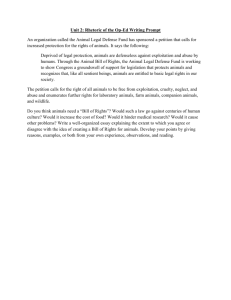
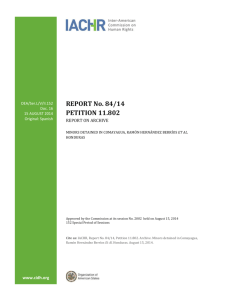
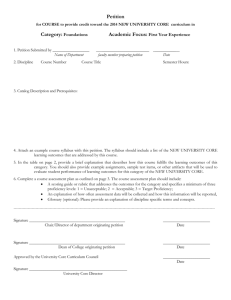
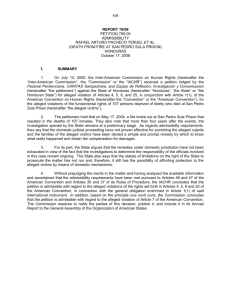
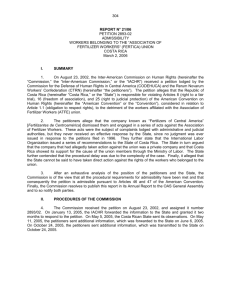
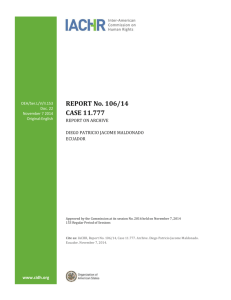
![REPORT No. 81/12[1] - Organization of American States](http://s3.studylib.net/store/data/007699530_2-73a5baa9be2d31ebf04737372b85c9e4-300x300.png)

